A babble of excited chatter greets the Minister for Justice as she opens the door to her Co Meath home.
Helen McEntee’s 18-month-old son Michael is delighted to see her home, although she’s not quite finished work just yet.
“I’ll be finished in five minutes,” she assures her little boy and his minder, before resuming her chat with Irish Country Living, where she is outlining sweeping reforms of domestic violence and hate crime laws and her hopes for improved access to childcare for parents.
Domestic abuse
An Garda Síochána’s recent revelation that domestic abuse accounted for the majority of murders in Ireland last year is described by the minister as “shocking”, but also not surprising.
The data copperfastened her determination to overhaul the criminal justice system to encourage more victims to come forward and report incidents of domestic abuse.
She and her justice department have designed programmes to support a victim’s journey and implement the Government’s zero tolerance plan for domestic, sexual and gender-based violence.
“The whole focus is that, from the minute the person decides ‘I’m going to get help. I’m going to go to the guards, talk to a health professional’, whoever, from the moment they take that first step, they are helped and that the system is better catered for victims and their needs,” she explains.
The approach is based on the four key principles of the Istanbul Convention: prevention, protection, prosecution and policy coordination.
Prevention is focused on education in schools and for young people, and training for healthcare workers, gardaí, the judiciary and others so that they understand what a victim has gone through.
In terms of protection, Minister McEntee is keen to ensure that when someone does come forward, the services and supports are there.
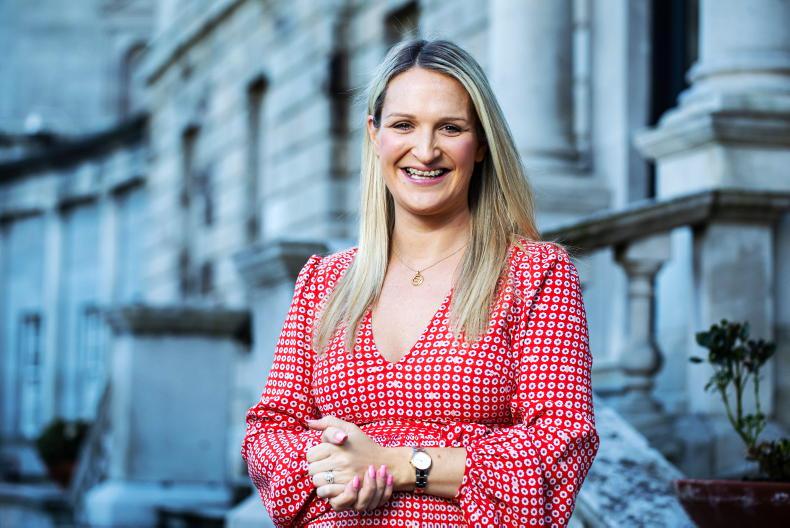
Minister for Justice, Helen McEntee outside Leinster House.
“That means making sure we have refuges in every county, which we don’t have at the moment,” she explains. “It means making sure that the services are uniform so no matter where you go to, you’re going to get the same standard of help and care.”
District court data showed that domestic violence charges relating to breaches of safety and protection orders, interim barring, barring and emergency barring orders almost doubled between 2019 and 2020. But despite the number of charges rising from 1,394 to 2,763, the majority of those charges were struck out, withdrawn or dismissed.
“That [successful prosecution] is something we need to get up. People need to know that when they do go through all of the hassle, heartache and stress of coming forward, there will be something at the end of it,” says the minister.
She quotes changes planned for court hearings to restrict access by the general public to cases involving sexual violence, preliminary trial hearings so a victim will not have to sit in court while technical points of law are debated, and physical screens so that victims will not be forced to face their abuser.
Removing barriers
“Every barrier that prevents a person coming forward, that’s what we want to take away,” she explains.
The revelation that more than 3,000 domestic violence calls to An Garda Síochána’s emergency 999 helpline were cancelled in 2019 and 2020 shocked the public.
Minister McEntee is frank: “It’s hugely disappointing.”
“The idea that someone – and one of the cases in particular involved a child – might have taken months or weeks to build up the courage to make the call and something wasn’t followed through on, I can’t say how disappointing it is.
“We just have to make sure that doesn’t happen. The vast majority of people working in this space are doing an amazing job. We need to make sure that there’s no situation where somebody who isn’t able to do [their job] properly, that they would actually be in that position at all,” she insists.
Rural crime
The recent Budget 2023 saw an extra €9m allocated to her department, a hike of 22%, to tackle domestic, sexual, gender-based violence; and support victims and implement the government’s zero tolerance plan.
It also saw funding announced for up to 1,000 new garda trainees and over 400 garda staff to be recruited.
“For a lot of people, making sure that they can see gardaí out and about, that’s one of their main priorities,” says the minister, conceding that garda recruitment was curtailed by the COVID-19 pandemic “more than I would like”.
She is keen to increase prosecutions for rural crime, and will outline how her department is beefing up local initiatives on property theft and break-ins by ‘motorway gangs’ at the upcoming Women and Agriculture conference.
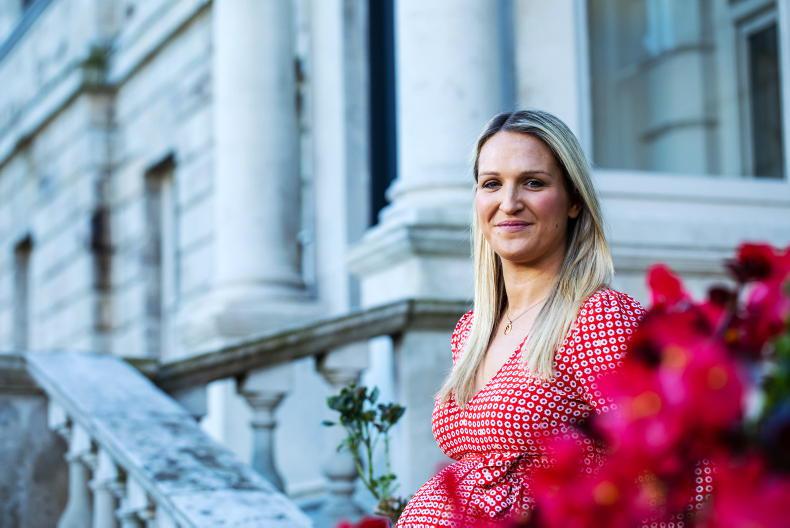
Minister for Justice, Helen McEntee outside Leinster House.
Childcare
With a new baby on the way in December, the minister is acutely conscious of the importance of suitable childcare for all working parents.
Making history as the first ever minister to have a baby and take maternity leave when she had son Michael in 2021, she believes childcare supports are improving but there is more to be done.
She cites ongoing work by her colleagues Minister for Children Roderic O’Gorman and Peter Burke, Minister of State for local government, on maternity leave for TDs and local councillors.
However she points out that women in politics are by no means the only ones who face challenges.
“Lots of people have the challenge that I have, in that you work late or you have unsociable hours, you work weekends. If you’re a nurse or doctor, there are lots of professions where you have these challenges as well.
“I think we just need to make sure that we have the right childcare supports in place,” she says, pointing to the recent budget cut of 25% to childcare fees.
“That’s a big start and we want to increase that further, we want to halve that in the next few years.”
Minister McEntee is also keen to encourage men to take parental leave.
“We need to make sure that men are taking leave too,” she says. Her husband Paul Hickey took six months parental leave from his job at pharmaceutical company Novartis Ireland when she returned to the Dáil.
“If more men are taking leave, it encourages more women to take leave because it feels more like a level playing field,” she says, complimenting the growing number of private companies who are offering men paid parental leave.
She also points to the promised increase in the Exchequer-funded paid parent’s leave from seven weeks to nine weeks to highlight its support for both mothers and fathers.
The minister has lots more to say on the topic but for now, though, it’s time for her to wrap up her call so she doesn’t miss Michael’s
bedtime.
College:
Studied at DCU for a BA (Hons) degree in Law, Politics and Economics, followed by a Masters degree in Communications and Journalism.
Early career:
Worked for a Citibank subsidiary initially, before working for her father Shane McEntee (Fine Gael) at the Department of Agriculture where he was minister of state with responsibility for food, horticulture and food safety.
First elected:
In a Meath East byelection in 2013, following the tragic death by suicide of her father Shane. Helen, aged 26, became the second youngest TD in the Dáil and the youngest female TD in the 31st Dáil. She visited her father’s grave on the morning she took her seat.
Political appointments:
Minister of State for mental health and older people at the Department of Health, May 2016.Minister of State for European Affairs at the Department of Foreign Affairs, June 2017. Minister for Justice, June 2020.
A babble of excited chatter greets the Minister for Justice as she opens the door to her Co Meath home.
Helen McEntee’s 18-month-old son Michael is delighted to see her home, although she’s not quite finished work just yet.
“I’ll be finished in five minutes,” she assures her little boy and his minder, before resuming her chat with Irish Country Living, where she is outlining sweeping reforms of domestic violence and hate crime laws and her hopes for improved access to childcare for parents.
Domestic abuse
An Garda Síochána’s recent revelation that domestic abuse accounted for the majority of murders in Ireland last year is described by the minister as “shocking”, but also not surprising.
The data copperfastened her determination to overhaul the criminal justice system to encourage more victims to come forward and report incidents of domestic abuse.
She and her justice department have designed programmes to support a victim’s journey and implement the Government’s zero tolerance plan for domestic, sexual and gender-based violence.
“The whole focus is that, from the minute the person decides ‘I’m going to get help. I’m going to go to the guards, talk to a health professional’, whoever, from the moment they take that first step, they are helped and that the system is better catered for victims and their needs,” she explains.
The approach is based on the four key principles of the Istanbul Convention: prevention, protection, prosecution and policy coordination.
Prevention is focused on education in schools and for young people, and training for healthcare workers, gardaí, the judiciary and others so that they understand what a victim has gone through.
In terms of protection, Minister McEntee is keen to ensure that when someone does come forward, the services and supports are there.

Minister for Justice, Helen McEntee outside Leinster House.
“That means making sure we have refuges in every county, which we don’t have at the moment,” she explains. “It means making sure that the services are uniform so no matter where you go to, you’re going to get the same standard of help and care.”
District court data showed that domestic violence charges relating to breaches of safety and protection orders, interim barring, barring and emergency barring orders almost doubled between 2019 and 2020. But despite the number of charges rising from 1,394 to 2,763, the majority of those charges were struck out, withdrawn or dismissed.
“That [successful prosecution] is something we need to get up. People need to know that when they do go through all of the hassle, heartache and stress of coming forward, there will be something at the end of it,” says the minister.
She quotes changes planned for court hearings to restrict access by the general public to cases involving sexual violence, preliminary trial hearings so a victim will not have to sit in court while technical points of law are debated, and physical screens so that victims will not be forced to face their abuser.
Removing barriers
“Every barrier that prevents a person coming forward, that’s what we want to take away,” she explains.
The revelation that more than 3,000 domestic violence calls to An Garda Síochána’s emergency 999 helpline were cancelled in 2019 and 2020 shocked the public.
Minister McEntee is frank: “It’s hugely disappointing.”
“The idea that someone – and one of the cases in particular involved a child – might have taken months or weeks to build up the courage to make the call and something wasn’t followed through on, I can’t say how disappointing it is.
“We just have to make sure that doesn’t happen. The vast majority of people working in this space are doing an amazing job. We need to make sure that there’s no situation where somebody who isn’t able to do [their job] properly, that they would actually be in that position at all,” she insists.
Rural crime
The recent Budget 2023 saw an extra €9m allocated to her department, a hike of 22%, to tackle domestic, sexual, gender-based violence; and support victims and implement the government’s zero tolerance plan.
It also saw funding announced for up to 1,000 new garda trainees and over 400 garda staff to be recruited.
“For a lot of people, making sure that they can see gardaí out and about, that’s one of their main priorities,” says the minister, conceding that garda recruitment was curtailed by the COVID-19 pandemic “more than I would like”.
She is keen to increase prosecutions for rural crime, and will outline how her department is beefing up local initiatives on property theft and break-ins by ‘motorway gangs’ at the upcoming Women and Agriculture conference.

Minister for Justice, Helen McEntee outside Leinster House.
Childcare
With a new baby on the way in December, the minister is acutely conscious of the importance of suitable childcare for all working parents.
Making history as the first ever minister to have a baby and take maternity leave when she had son Michael in 2021, she believes childcare supports are improving but there is more to be done.
She cites ongoing work by her colleagues Minister for Children Roderic O’Gorman and Peter Burke, Minister of State for local government, on maternity leave for TDs and local councillors.
However she points out that women in politics are by no means the only ones who face challenges.
“Lots of people have the challenge that I have, in that you work late or you have unsociable hours, you work weekends. If you’re a nurse or doctor, there are lots of professions where you have these challenges as well.
“I think we just need to make sure that we have the right childcare supports in place,” she says, pointing to the recent budget cut of 25% to childcare fees.
“That’s a big start and we want to increase that further, we want to halve that in the next few years.”
Minister McEntee is also keen to encourage men to take parental leave.
“We need to make sure that men are taking leave too,” she says. Her husband Paul Hickey took six months parental leave from his job at pharmaceutical company Novartis Ireland when she returned to the Dáil.
“If more men are taking leave, it encourages more women to take leave because it feels more like a level playing field,” she says, complimenting the growing number of private companies who are offering men paid parental leave.
She also points to the promised increase in the Exchequer-funded paid parent’s leave from seven weeks to nine weeks to highlight its support for both mothers and fathers.
The minister has lots more to say on the topic but for now, though, it’s time for her to wrap up her call so she doesn’t miss Michael’s
bedtime.
College:
Studied at DCU for a BA (Hons) degree in Law, Politics and Economics, followed by a Masters degree in Communications and Journalism.
Early career:
Worked for a Citibank subsidiary initially, before working for her father Shane McEntee (Fine Gael) at the Department of Agriculture where he was minister of state with responsibility for food, horticulture and food safety.
First elected:
In a Meath East byelection in 2013, following the tragic death by suicide of her father Shane. Helen, aged 26, became the second youngest TD in the Dáil and the youngest female TD in the 31st Dáil. She visited her father’s grave on the morning she took her seat.
Political appointments:
Minister of State for mental health and older people at the Department of Health, May 2016.Minister of State for European Affairs at the Department of Foreign Affairs, June 2017. Minister for Justice, June 2020. 







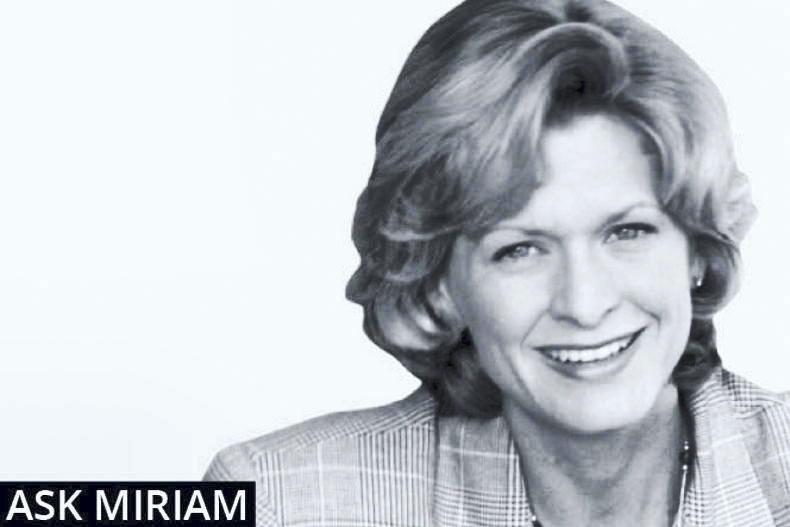
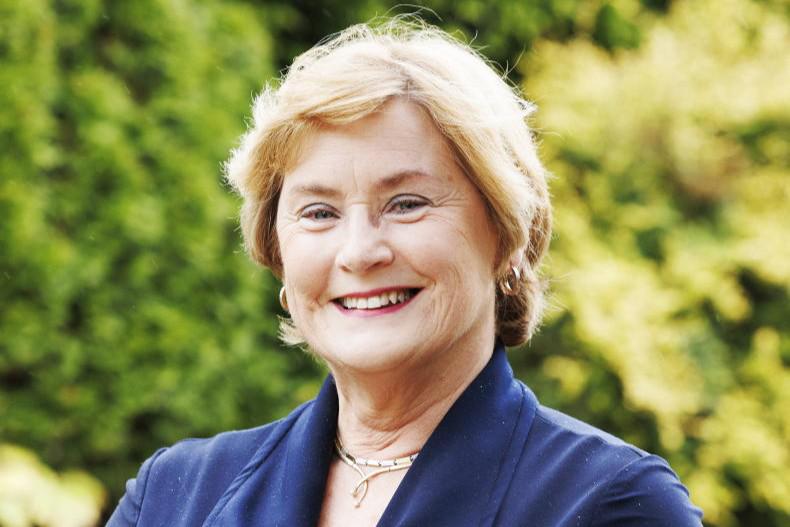
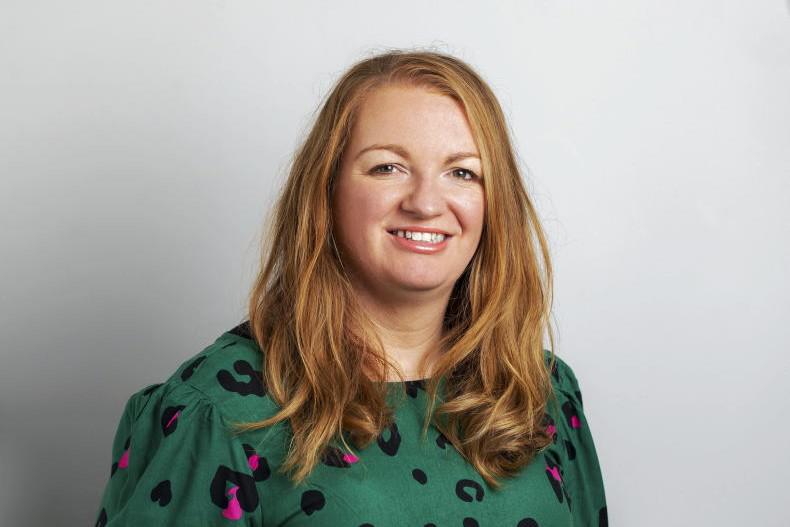
SHARING OPTIONS